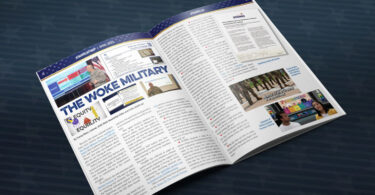By Greg Salsbury
STARRS Board of Advisors
Christopher Rufo, Douglas Murray, and Victor Davis Hanson have all pointed out that we are in the middle of a cultural revolution that is assailing our culture, values, traditions, and institutions, our national security and sovereignty, our economy, our Constitution and rule of law, and our overall quality of life.
The percentage of Americans saying they are worse off is at its highest level since 2009.
One of the most fascinating aspects of this obvious decline is that leftists have managed to convince a very large portion (in many cases a majority) of Americans to support the divisive and corrosive policies producing their own destruction.
What arguments have leftists used to accomplish this?
Chiefly, though not exclusively, they have employed a trifecta of completely nonsensical tropes about race, gender, and climate.
If you had explained to the typical American a half-century ago that, by the 2020s, America would be undergoing a fundamental transformation driven by new realizations about multiple genders, deep-seated and pervasive white supremacy, and a world literally close to incinerating, he likely would have laughed in your face. The absurdity of it would still be laughable if it weren’t so successful and damaging.
So how did it succeed? Rufo, Murray, and Hanson have done excellent work in explaining the history, concepts, and motivations behind the left’s long march through the institutions to the current revolution, from Marcuse through Bell.
But there may be something more fundamental, and that’s how the revolutionaries communicated their message.
That may help explain how they could get such a large portion of Americans to support such ludicrous policies (or at least vote for the people who do) and why it has accelerated so significantly in just the last few years.
When you think about it, this degree of success with such silly predicates can be achieved only by meeting a couple of critical requirements.
First, you need most people to be dependent on a single medium/format for the bulk of their information. Second, you need significant control of that medium’s content.
Over-reliance on a single medium makes people more vulnerable to manipulation.
This may be why cyberbullying disproportionately affects adolescents and teens who “live” on their smartphones.
Furthermore, research shows that when competing channels or media exist—such as strong parent-child relationships—cyberbullying is less prevalent.
After the failed 2002 coup in Venezuela, President Hugo Chavez quickly shut down private media and replaced them with state-run media.
This may help explain why, despite almost single-handedly destroying one of the most thriving South American economies and societies in existence, his popularity was near its zenith (57% approval) in his last year in office.
On a personal level, part of why my own family in World War II Germany knew that the Nazi propaganda was exactly that was because they had access to a shortwave radio. With a sentry posted at the window to watch for Brownshirts, they could listen to the BBC for brief periods. The rest of the population was not as fortunate.
Without over-dependence on a single medium, the despot’s task is often too great. There is too much competition for both bandwidth and credibility.
There are too many competing formats spewing pesky things like verifiable facts, firsthand testimony, well-argued, logical essays and presentations, and empirical and visual evidence, all of which might counter the preferred narrative.
But if one can exclude most contrary information, the focus can be on simple, endlessly repeated themes in various styles—simple verbiage, celebrity endorsements, memes, cartoons, opinion pieces, pseudo-science research results, etc.
Advertisers have taught us that it’s difficult to overstate the power of simple repetition.
That’s how one of the best-selling soaps for 150 years came to be viewed as mild—because “it floats.” (So does tree bark, but I know that I don’t want to rub my face with it.)
Similarly, an unrelenting, multi-year barrage of “Russia, collusion, and Trump” had much the same impact on many American voters – with nearly half of them still clinging to the view of President Trump as a Russian asset despite the Special Counsel, the U.S. Attorney General, and years of official investigation concluding there was no evidence for this.
Usually, single-medium dependence is a tall order. For generations, while there was some wholesale eradication of media (e.g., telephones eliminated telegraphs), each new medium usually added to the kaleidoscope of options (e.g., word of mouth and speeches, theater, artwork) by including murals, paintings, statuary and music, documents and books, photography, phonography, film, radio, television, and the internet.
There wasn’t a clear and undisputed media winner until the emergence of the smartphone beginning in 2007.
I have previously noted the astounding growth, pervasiveness, and dominance of the 5” x 3” screen and its impact on Americans’ information consumption.
By 2019, the smartphone had surpassed television for most hours viewed. Some 97% of all Americans have a cellphone today, nearly all smartphones, and time spent using it—particularly for social media—continues to climb, averaging some 4.5 hours per day at the end of last year, and is projected to increase another 55 minutes per day by the end of 2023.
In sum, the smartphone is now the undisputed king of media format—perhaps to a degree unparalleled by any other medium in modern history.
Oh sure, radio, television, paintings, and the rest of it still exist. And supposedly, people still talk to each other in person when forced, but the sum of dialogue, information, and data passing through these other media is now dwarfed by the volume flowing through the little device in our pockets or on our wrists.
The smartphone provided the foundation for filling that first requirement for controlling thought; that is, most of the populating defaulting to a single medium for almost all of its information, education, news, socialization, communication, and entertainment.
Media experts tell us that the smartphone, social media, and video formats are well suited to the opposite of in-depth, thoughtful analysis.
Rather, they specialize in very brief, headline-type, 140-character information – 15-second videos, memes, and bullet point proclamations.
The second requirement needed to obtain substantial support for any given narrative is to have a similar unification/consolidation of the content flowing through that dominant medium.
With Apple’s stranglehold on apps and browsers, Google owning some 90+% of all search functions, Meta (formerly Facebook) and WhatsApp (owned by Meta) overseeing the lion’s share of all social media, and YouTube and a handful of others providing most music and video content, that control rests in the hands of shockingly few entities.
With these two requirements met, the overwhelmingly Left-leaning Masters of the Universe, on their own initiative and with state input, make certain that the readers/viewers/listeners will receive only information that affirms the preferred narratives.
Molly Ball exposed how some of these entities collaborated to “fortify” the 2020 election.
Robert Epstein’s extensive research indicated that Google’s search bias and proactive messaging could have easily swayed 6 million voters in the 2020 presidential election.
The 5th Circuit Court of Appeals recently found that the White House, Surgeon General, CDC, and FBI collaborated to quash the First Amendment rights of millions of Americans.
Further, consumers regularly learn that anyone who opposes the state narrative is quickly and thoroughly branded as a loathsome human in general—racist, homophobic, misogynistic, hateful, stupid, white supremacist, a science denier, and possibly criminal.
Utter something out of line with the accepted narrative, whether opinion or factual, and you may be censored or even terminated from your job.
In fact, as Russell Brand has learned, mere allegations, devoid of any legally established validity whatsoever, can result in swift and significant repercussions from the media overlords.
Conversely, affirming support for the given narrative makes someone a good person. Posts, clicking the correct “like” buttons, and broadcasting the correct opinions are applauded and the authors highlighted, while actual behavior supporting the narrative, such as violent rioting or assuming a nonbiological gender, will be deemed downright heroic and celebrated accordingly.
Malcolm X, Noam Chomsky, Allen Ginsburg, and Jim Morrison agreed that whoever controls the media controls the mind.
If you want a successful American revolution today, you must tailor your messaging to a smartphone format—short, simple, quickly digested snippets—and navigate the rules of the internet determined by the Masters of the Universe.
It is unlikely that we will reduce our reliance on smartphones anytime soon.
But looking forward, allowing a handful of powerful Leftists to monopolize that content is a recipe for disaster and must be opposed at every opportunity.








Leave a Comment